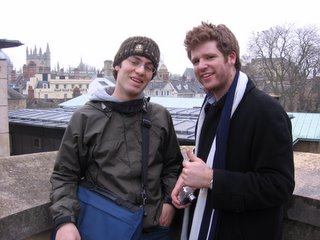
Anyone who has ever been amused to see the photo of a terrified looking Prince Charles pouring a pint, found in the King’s Arms Pub within Wadham College, might be disappointed to learn that they have the same exact print over at the Angel and Greyhound. I don’t know if either pub was actually the place where the photo was taken, but it certainly diminishes how amusing it is to see it in a second place. It’s like when you’re in Venice and you realize that all the cheap table glass in Murano is identical in each shop and comes from China.
Touring Oxford
This afternoon, I met Spencer and his partner for the World Debating Championships and gave them a walking tour of Oxford. Before carrying on, I should note that Michael Kotrly and his partner won the tournament, a very impressive feat. I know Michael through UBC debate, where I believe I was treasurer during his presidency. My congratulations go out to him for an extremely impressive performance.
The walk, which I recommend to anyone inclined to play tour guide in Oxford, began at Cornmarket and High Street, from which we walked up St. Aldate’s towards the Folly Bridge. Glancing into the Christ Church main quad, we passed The Head of the River and walked along the Isis until the paths diverge northward again along the eastern canal. We followed that up past Magdalen, where I would recommend having a look at the gardens and greenhouses, before turning left and heading back up the high street towards Carfax.
We ducked into University College, through Logic Lane, and passed through two of their quads to see the Shelley Memorial. We then passed St. Mary’s Church and briefly entered the Codrington Library from Radcliffe Square. Leaving the square from the north, we went down Hollywell Street to New College, where I showed them the plague mound and the cloisters (as featured, somewhat incongruously as far as architecture goes, in the most recent Harry Potter film). Leaving New, we walked back up Hollywell Street, had a look through Wadham, the gardens, and library court, before going up Parks Road to Rhodes House and the Natural History Museum.
After looking at the displays there and in the Pitt Rivers museum, we doubled back. One thing I had never noticed before: the Natural History Museum has a stuffed kakapo, of all animals. Those who don’t know what I am talking about are strongly encouraged to read Douglas Adams’ excellent book Last Chance to See.
The last stop of the four-hour tour was The Turf, where we had a pint before the debaters caught their train back to London. It was good to see Spencer. He doesn’t seem to have been too badly grizzled by the extreme responsibilities of his post as President of the UBC Alma Mater Society.
What made today particularly special was seeing a trio of people I have missed a lot over the break. Bilyana is back from her winter break trip home, as are Margaret and Roham. I ran into Bilyana outside Rhodes House while giving the tour and Roham outside the Natural History Museum. We simply must organize a study group for the statistics exam next Friday. Margaret I met after I noticed her light on while walking back from the train station. Though she is mired in work, she still brings a friendly feeling back into the city, as seeing all three friends did. I now believe that term is starting again in a practical, rather than a theoretical, way. It scarcely seemed possible during the days when I wandered an abandoned Oxford from and abandoned Wadham with only excellent conversations with Louise to break the solitude.
Evening in Oxford with Wadham graduates
As part of a general effort to get to know people in my college better, I followed Kelly and her sister Bonnie to the King’s Arms tonight to meet a whole crew of Wadham graduates tonight. Shifting between there and The Mitre, people had a few drinks and conversed. I owe David Patrikarakos for the pint of Guinness he kindly bought me.
Among the graduates who I did not know previously, I was particularly glad to meet a particle physicist working on dark matter and a fellow Vancouverite. In the latter case, the similarities are legion. We both lived near Trout Lake, we both have some connection to North Vancouver high schools (Handsworth and Carson Graham, respectively), and we both did judo with Hiroshi Nishi as an instructor. We both went to UBC and took courses with Dennis Danielson. Given that he did an honours English degree, I am sure we know a lot of the same people.
Incidentally, and before I go on too long about this, there have been a lot of headaches with regards to Wadham people and getting mentioned on the blog. There are those who tremble at the prospect and, when I know who they are, I generally avoid mentioning them at all and certainly avoid saying anything personal. Then there are those who are neutral, those I simply don’t know the position of, and those who are positively irked not to be mentioned. It’s a lot to remember, so my apologies if I slip up from time to time. A few ugly experiences are teaching me to err on the side of caution. If I don’t mention you by name, it’s probably because I barely know you and met you in a context that someone could possibly, maybe find objectionable (like… a pub… gasp!).
Anyhow, the number of Wadham graduate students who I had rarely if ever seen before demonstrates the extent to which a bit more concentration on the social side of college may be warranted. I shouldn’t let my general aversion to loud music and strong aversion to cigarette smoke be too much of a restricting factor. Thankfully, The Mitre is significantly less smoky than the King’s Arms, which is becoming infamous in my mind for an exceptionally high carcinogen count.
The election
Frustrated by scandal and a general sense of dissatisfaction, Canadians want a political party that they can really believe in, rather than support as the least bad option. As the campaign carries on, it is increasingly clear that the Tories are not that party. From mandatory sentencing to militarizing the Arctic, their policies run the gamut from retrograde to foolish. Much as I would love to have an opposition party with a credible chance at serving as a good government, these are simply not them.
The Liberal party deserves some punishment for sleaze and an uninspired agenda under Paul Martin, but the people who would suffer under a Tory government (poor people, people outside Alberta and Ontario) don’t deserve it.
One last note: people should beware direct interpretation of Canadian electoral polls. As I explained to Margaret, the absolute share of the vote has no direct bearing in a Parliamentary system like Canada’s. Since each riding elects an MP and the party with the most MPs is called upon to form a government, all you need in theory is a single-vote win in a plurality of ridings. While that is very unlikely, the same property means that parties with broad national support have an advantage against those with concentrated support. Every extra Tory vote in a solidly blue (Canadian Tories use blue, Liberals use red) riding in Alberta, beyond the winning vote, is effectively wasted. That said, it’s not encouraging to see support for the Conservatives as high as it is, given how their campaign has been unfolding.
- According the the Royal Mail registered mail tracking service, my Chevening Scholarship application “has been passed to the overseas postal service for delivery.” Fingers tightly crossed.
- Here’s an entry about electoral security being done right in Wisconsin.
- Corporate social responsibility, being done wrong by Microsoft.
- It’s amusing to note just how frequently some people seem to be Googling themselves and following the links to my blog. Either people Googling themselves or someone at a particular IP address Googling someone else on a near-daily basis.
- Tomorrow morning, I am meeting Louise to do some pre-term reading. I shall be extremely glad for her company.

